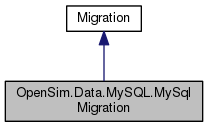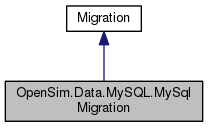This is a MySQL-customized migration processor. The only difference is in how it executes SQL scripts (using MySqlScript instead of MyCommand)
More...
|
| | MySqlMigration () |
| |
| | MySqlMigration (DbConnection conn, Assembly assem, string subtype, string type) |
| |
| | MySqlMigration (DbConnection conn, Assembly assem, string type) |
| |
| | Migration () |
| | Have the parameterless constructor just so we can specify it as a generic parameter with the new() constraint. Currently this is only used in the tests. A Migration instance created this way must be then initialized with Initialize(). Regular creation should be through the parameterized constructors. More...
|
| |
| | Migration (DbConnection conn, Assembly assem, string subtype, string type) |
| |
| | Migration (DbConnection conn, Assembly assem, string type) |
| |
| void | Initialize (DbConnection conn, Assembly assem, string type, string subtype) |
| | Must be called after creating with the parameterless constructor. NOTE that the Migration class now doesn't access database in any way during initialization. Specifically, it won't check if the [migrations] table exists. Such checks are done later: automatically on Update(), or you can explicitly call InitMigrationsTable(). More...
|
| |
| void | InitMigrationsTable () |
| |
| void | Update () |
| |
|
| override void | ExecuteScript (DbConnection conn, string[] script) |
| | Executes a script, possibly in a database-specific way. It can be redefined for a specific DBMS, if necessary. Specifically, to avoid problems with proc definitions in MySQL, we must use MySqlScript class instead of just DbCommand. We don't want to bring MySQL references here, so instead define a MySQLMigration class in OpenSim.Data.MySQL More...
|
| |
| void | ExecuteScript (DbConnection conn, string sql) |
| |
| void | ExecuteScript (string sql) |
| |
| void | ExecuteScript (string[] script) |
| |
| virtual int | FindVersion (DbConnection conn, string type) |
| |
This is a MySQL-customized migration processor. The only difference is in how it executes SQL scripts (using MySqlScript instead of MyCommand)
Definition at line 44 of file MySQLMigrations.cs.
| OpenSim.Data.MySQL.MySqlMigration.MySqlMigration |
( |
| ) |
|
|
inline |
| OpenSim.Data.MySQL.MySqlMigration.MySqlMigration |
( |
DbConnection |
conn, |
|
|
Assembly |
assem, |
|
|
string |
subtype, |
|
|
string |
type |
|
) |
| |
|
inline |
| OpenSim.Data.MySQL.MySqlMigration.MySqlMigration |
( |
DbConnection |
conn, |
|
|
Assembly |
assem, |
|
|
string |
type |
|
) |
| |
|
inline |
| override void OpenSim.Data.MySQL.MySqlMigration.ExecuteScript |
( |
DbConnection |
conn, |
|
|
string[] |
script |
|
) |
| |
|
inlineprotectedvirtual |
Executes a script, possibly in a database-specific way. It can be redefined for a specific DBMS, if necessary. Specifically, to avoid problems with proc definitions in MySQL, we must use MySqlScript class instead of just DbCommand. We don't want to bring MySQL references here, so instead define a MySQLMigration class in OpenSim.Data.MySQL
- Parameters
-
| conn | |
| script | Array of strings, one-per-batch (often just one) |
Reimplemented from OpenSim.Data.Migration.
Definition at line 61 of file MySQLMigrations.cs.
The documentation for this class was generated from the following file:


 Public Member Functions inherited from OpenSim.Data.Migration
Public Member Functions inherited from OpenSim.Data.Migration Protected Member Functions inherited from OpenSim.Data.Migration
Protected Member Functions inherited from OpenSim.Data.Migration Protected Attributes inherited from OpenSim.Data.Migration
Protected Attributes inherited from OpenSim.Data.Migration Properties inherited from OpenSim.Data.Migration
Properties inherited from OpenSim.Data.Migration 1.8.6
1.8.6